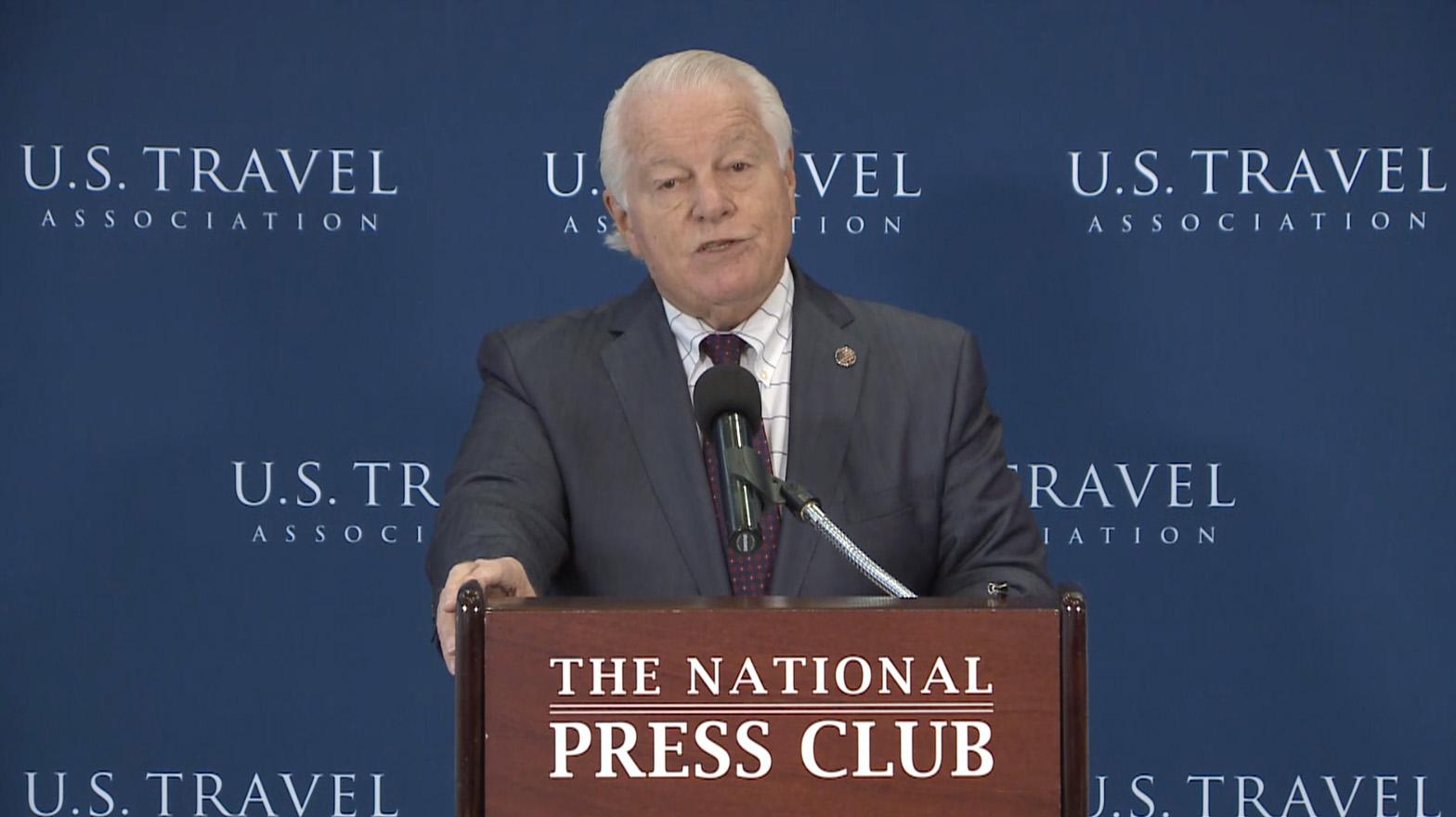Travel’s Next Chapter: More Globally Competitive, Innovative & Unified

US Travel Association president and CEO Roger Dow has called on the US travel industry to “not simply recover” from the devastating $500 billion pandemic-related losses in 2020, but to “rebuild the industry” into one that will be “even better than it was before the crisis—one that’s more globally competitive, more innovative, more unified.”
In his State of the Travel Industry address at the National Press Club on Jan. 27, Dow said the industry’s unemployment rate climbed to 51%, more than double the national unemployment rate at the height of the Great Depression.
But, he said, the story of the 2020 pandemic is far from over. “Our entire industry is joining together to implement rigorous health and safety protocols to keep our guests and workers safe. Now we must all work together on the next chapter—one that will be fueled by innovation, resilience tenacity and focus.”
He said this is the opportunity for a new Congress and new administration to “work with our industry to revive our national economy to restore millions of lost jobs, and to bring America together again.”
Dow called for the industry and government to build on the “heartfelt legislative victories we achieved in 2020, including the recent coronavirus relief legislation passed in December. With your help, last month Congress extended the Paycheck Protection Program [PPP] and expanded it to include Destination Marketing Organizations (DMOs). We helped elected officials understand that DMOs are the backbone of the US travel industry. They drive demand, promote all small businesses, play a critical role, and welcome back visitors to United States by safely restarting meetings and events, and reviving mainstream across America. The relief bill also included a second draw on PPP, which is critical to hotels and restaurants among other travel sectors, as well as emergency relief funding for airports and concessions to help maintain operations and prevent the spread of the infection. And it extended the employee retention tax credit and the Coronavirus Relief Fund through 2021. These measures were a start, but our work is not done,” he said
To jumpstart travel and boost the American economy, Dow laid out the following priorities:
- First, America must get a handle on this virus. “We must vigorously adhere to the sound health and safety practices, especially wearing masks and physical distancing. We also need federal leadership to accelerate vaccine distribution. We need to encourage everyone to get vaccinated, as soon as possible as soon as shots are available to them.”
- Second, the organization is encouraging the Biden administration to establish a national plan to build confidence in domestic travel by developing clear guidance.
- Third, the association is encouraging the administration to boost travel demand with aggressive economic stimulus measures, “which include traveling meetings, tax credits and promotional dollars for destinations.
- Fourth, the administration should reopen international travel through risk-based protocols, and remove the international travel bans, which could be the “first step to welcome 116 million visitors to the US by 2028.”
Dow also called on the federal government to prioritize infrastructure now “so that it can emerge from the pandemic more connected and more positioned for faster, enduring growth.” Dow said the organization has asked the federal government to invest $550 billion in highways transit systems, airports and passenger rail over the next five years.
He said the US travel industry also needs to “increase our global competitiveness so that international travel can safely resume, and that demand will provide a huge boost to local economies.”
Accelerating the implementation of biometric technology will strengthen travel and provide “faster facilitation greater accuracy and a more secure travel environment,” he said. “These touchless systems also create a more convenient, hygienic user experience—an important factor in dealing with this public health crisis.”
He wants to expand the biometric exit systems, currently operating in 20 airports and 17 ports. “We’re asking the federal government to set and communicate clear standards for privacy and security biometric data must be used for identification purposes only, not for surveillance and law enforcement purposes. Americans must have the option to participate, voluntarily,” Dow said.
He also called on the government to continue to improve the Real ID Act. “According to the Department of Homeland Security, only 38% of Americans are Real ID-compliant,” Dow said, adding that enforcement is set to begin on Oct. 1, 2021, “but the pandemic has made it near impossible to get to the DMV [Department of Motor Vehicles]. Given the low compliance rate and the complications of the pandemic, many Americans could be turned away in security,” he said, calling for a delay in the deadline for enforcement “until it can be proven through metrics that implementation will not reverse or slow travel’s recovery. The federal government should also develop alternative screening procedures for travelers who show up to the airport without Real ID,” he said.
Finally, Dow said travel facilitation programs must be enhanced. “The most innovative security programs also make travel more accessible and more efficient. A more streamlined approach to travel facilitation will be crucial on handling the resurgence of travel demand. TSA Precheck, Global Entry, Century and Nexus should all be consolidated into one program. Global Entry and preclearance locations should be expanded to the Visa Waiver Program countries, and the US should expedite visas for low risk, applicants and automate non-immigrant travel visas.”
This is an ambitious agenda, Dow acknowledged, but he said travel’s next chapter will be “fueled by an even greater focus, a greater determination as we write the next chapter of our industry’s remarkable story.”


